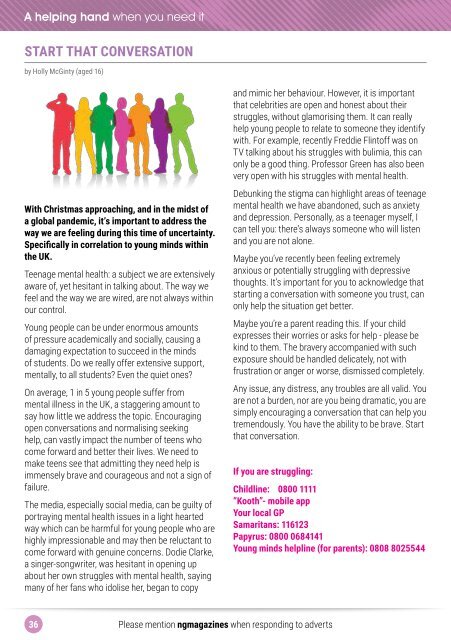NG2 Dec/Jan 2021
Local business directory and community magazine
Local business directory and community magazine
Create successful ePaper yourself
Turn your PDF publications into a flip-book with our unique Google optimized e-Paper software.
start that conversation<br />
by Holly McGinty (aged 16)<br />
With Christmas approaching, and in the midst of<br />
a global pandemic, it’s important to address the<br />
way we are feeling during this time of uncertainty.<br />
Specifically in correlation to young minds within<br />
the UK.<br />
Teenage mental health: a subject we are extensively<br />
aware of, yet hesitant in talking about. The way we<br />
feel and the way we are wired, are not always within<br />
our control.<br />
Young people can be under enormous amounts<br />
of pressure academically and socially, causing a<br />
damaging expectation to succeed in the minds<br />
of students. Do we really offer extensive support,<br />
mentally, to all students? Even the quiet ones?<br />
On average, 1 in 5 young people suffer from<br />
mental illness in the UK, a staggering amount to<br />
say how little we address the topic. Encouraging<br />
open conversations and normalising seeking<br />
help, can vastly impact the number of teens who<br />
come forward and better their lives. We need to<br />
make teens see that admitting they need help is<br />
immensely brave and courageous and not a sign of<br />
failure.<br />
The media, especially social media, can be guilty of<br />
portraying mental health issues in a light hearted<br />
way which can be harmful for young people who are<br />
highly impressionable and may then be reluctant to<br />
come forward with genuine concerns. Dodie Clarke,<br />
a singer-songwriter, was hesitant in opening up<br />
about her own struggles with mental health, saying<br />
many of her fans who idolise her, began to copy<br />
and mimic her behaviour. However, it is important<br />
that celebrities are open and honest about their<br />
struggles, without glamorising them. It can really<br />
help young people to relate to someone they identify<br />
with. For example, recently Freddie Flintoff was on<br />
TV talking about his struggles with bulimia, this can<br />
only be a good thing. Professor Green has also been<br />
very open with his struggles with mental health.<br />
Debunking the stigma can highlight areas of teenage<br />
mental health we have abandoned, such as anxiety<br />
and depression. Personally, as a teenager myself, I<br />
can tell you: there’s always someone who will listen<br />
and you are not alone.<br />
Maybe you’ve recently been feeling extremely<br />
anxious or potentially struggling with depressive<br />
thoughts. It’s important for you to acknowledge that<br />
starting a conversation with someone you trust, can<br />
only help the situation get better.<br />
Maybe you’re a parent reading this. If your child<br />
expresses their worries or asks for help - please be<br />
kind to them. The bravery accompanied with such<br />
exposure should be handled delicately, not with<br />
frustration or anger or worse, dismissed completely.<br />
Any issue, any distress, any troubles are all valid. You<br />
are not a burden, nor are you being dramatic, you are<br />
simply encouraging a conversation that can help you<br />
tremendously. You have the ability to be brave. Start<br />
that conversation.<br />
If you are struggling:<br />
Childline: 0800 1111<br />
“Kooth”- mobile app<br />
Your local GP<br />
Samaritans: 116123<br />
Papyrus: 0800 0684141<br />
Young minds helpline (for parents): 0808 8025544<br />
36 Please mention ngmagazines when responding to adverts


















